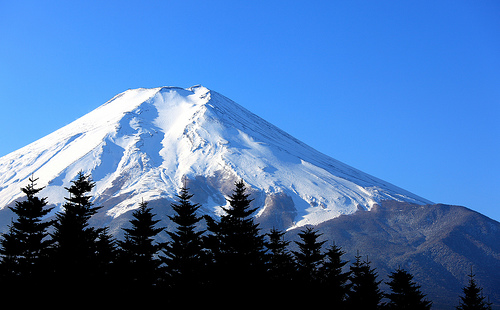If a tree falls in a forest and no one is around to hear it, does it matter if it made a sound or not when the tree was doing its own thing? Blogger Mojix ponders mountains, morals, and messages in a Japanese post titled “Is it wrong to climb Mount Fuji empty-handed? [1]“.
Note: The post was translated in its entirety with permission from the blogger. All links were added by Tomomi Sasaki for reference.
Photo of Mount Fuji [2] by Flickr user TANAKA Juuyoh (田中十洋) [3] under a Creative Commons Attribution license [4]
Excerpt from the Yomiuri Online article “Man climbs Mount Fuji empty-handed on a whim, needs help”, published July 3rd, 12:07: (Note: the article [5] is no longer online)
July 2nd, 21:45 – A man called the police from the Eight Station on Mount Fuji [altitude: 3,250 meters], saying “I’m climbing Mount Fuji but didn’t come with a flashlight. It’s too dark to see the road and I’m scared. Please help me”.
Six mountain rescue workers from the Fujinomiya Precinct of Shizuoka Prefecture Police headed out around 23:30 and rescued the man who had climbed down to the Sixth Station [altitude: 2,490 meters] by himself. The man had no injuries. According to the Precinct, he is a 22 year old pachinko parlor worker from Nakano Ward in Tokyo. He had started climbing Mount Fuji from the Fifth Station on the Fujinomiya Course around 17:00. Upon reaching the Ninth Station [altitude: 3,460 meters], he gave up and began to descend before calling for help with his cell phone when it became dark.
The man was wearing a long sleeved shirt, jeans, and sneakers. He was empty-handed; he wasn’t carrying any food or equipment. The climbing season for Mount Fuji started on July 1st but the temperature around the Sixth Station is 2 degrees Celcius. The man had no climbing experience and was apologetic, saying “I started climbing on a whim”. The Precinct stated, “One wrong step and it would have been a matter of life and death. We’d like everyone to come fully prepared, even for summer mountains.”
View this graph [6] for a visualization of the altitude of each Station in the article “A guide for climbing Mount Fuji and enjoying Mother Nature [7]” from the Japan National Tourism Organization.
Mojix goes on to explain his viewpoint after the excerpt.
To an experienced climber, attempting Mount Fuji without any gear is ridiculous. They might say, “Don’t underestimate mountain climbing!”. Be it Mount Fuji or the South Pole however, I think that the decision is fundamentally one that should be left to the individual.
I bet there are lots of folks that climb Mount Fuji empty-handed. It becomes newsworthy like this when an incident occurs but many people probably return unharmed. Perhaps they even come back thinking, “Oh, that was much easier because I wasn’t carrying anything”.
Now, the problem is when a person gets lost or almost dies. They then require rescue, which incurs a cost to society in general. Even if a rescue attempt isn’t made and they perish, a dead body can’t just be left up in the mountains. It's a burden either way and society foots the bill.
The issue isn’t about climbing Mount Fuji without equipment. It’s about “not being able to take full responsibility of one’s actions” and “causing problems to society” when something happens.
On the other hand, if a person can take full responsibility and not cause problems, nothing should be prohibited, not even the most foolish undertaking.
The rescued man was purposely described as being “a 22 year old pachinko [8] parlor worker from Nakano Ward”. The description of his outfit with the comment “not carrying neither food nor equipment” leaves the reader with the impression that he is a carefree, perhaps even reckless, fellow. Think about it, though! People will get lost when they get lost and die when they die… even powerful executives and high level bureaucrats, and even in full gear. In fact, it could be said that an experienced person might be more at risk because of false confidence.
What it boils down to is that this type of article is one form of “public service announcement”. If more people start climbing Mount Fuji without the proper equipment, the chance of trouble increases and the cost of rescue missions starts to pile up. So, they tell us to be properly equipped when climbing Mount Fuji. It’s like those Moral Education classes in elementary school, but all throughout the year and utilizing the mass media.
A prohibition to climb Mount Fuji without equipment doesn’t really affect our freedom. However, the influence is more widespread when the topic is restriction on Konjac jelly [9] manufacturing, selling medicine online [10], hiring temp workers [11], or terminating employment contracts [12]. The government’s position is usually to promote stricter restrictions for these kinds of topics. Therefore, any news with a “public service announcement” flavor takes the angle of “Disasters occur because there are no restrictions in place. If we make rules, we can prevent these disasters.” The disadvantages, cost, or unfairness that would arise from such rules do not receive any mention.
While there’s no denying that the man took a foolhardy action, making a point of mentioning that he was “a 22 year old pachinko parlor worker” gives off the air of a carefully designed public service announcement. Had the man been an executive or high ranking bureaucrat, I very much doubt that this would have hit the news at all.
